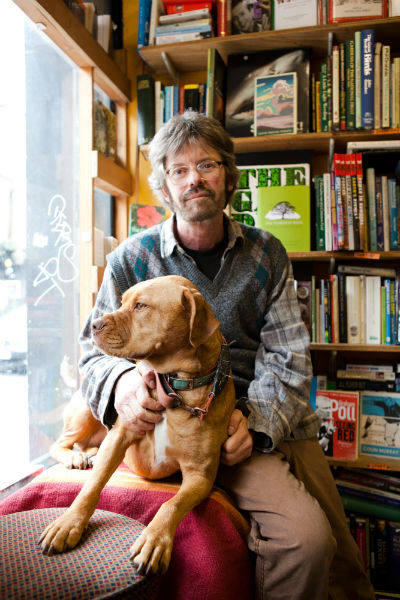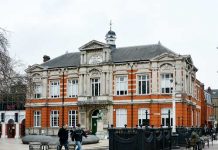
Credit: Antonio Sansica – www.antoniosansica.com
By Luke Massey
With its iconic hand-painted sign, its labyrinthine abundance of books and the ubiquitous greeting by much-loved shop mascot Rosa the dog: Bookmongers is a Brixton landmark. It is an oasis of calm in this frantic city, and each trip is a little piece of magic. It is a place which sleeps with its eyes open: even when closed, the shutters have a full replica of the internal shop-front painted onto them – replete with Rosa pondering out of the window from the doorway. The shop is never far from my heart.
Needless to say, for a long time I’ve been a devotee of Bookmongers – making the pilgrimage most Saturday’s to trawl for an unknown gem amongst the stacks of literature. So it was a real delight to catch up with the owner, Patrick Kelly, to find out a bit more about how it all started over 20 years ago, the future of the shop and his relationship with Brixton.
‘We originally opened up in 404 Coldharbour Lane which is next door to Blacker Dread records,’ Patrick tells me. ‘I was working as a social worker and was completely burnt-out. A friend of a friend was out of work so the two of us thought it could be a viable and interesting way of making a living. The first day we opened the doors we were busy. This is a testament to Brixton’s population more than to us. We stayed at that space for more than a year but grew out of it far earlier than that. 439 Coldharbour Lane (an old plumbers’ merchant) became available and we moved.’
I probe to find out what elusive quality it is that makes Bookmongers, much like Brixton itself, such a unique and interesting place. Patrick is demure:
‘The main strength of Bookmongers is that it exists in such a highly literate area of the city. I would hazard to say that there are very few people that wander down Coldharbour Lane who would not find something to read inside the shop. We have also allowed ourselves to mutate into a shop that reflects the reading tastes of the neighbourhood. I would like to think that this has worked both ways and that maybe what we offer has influenced the neighbourhood.’
I find that this typical of Patrick’s humility, but also reflective of his deep feelings toward Brixton – a place he has made his home since travelling here in his twenties from a suburb just outside of Boston.

‘If you really want to know what I think of Brixton and what it means to me,’ he says, ‘read a Charles Bukowski poem called Nirvana. I was that young man except I didn’t get back on the bus.’
Reading ‘Nirvana’ is revealing and poignant. Patrick, like many of us, found the magic in Brixton: the allure of an unknown quantity – manifested in the community, the diversity, and the holy backstreets of this beautiful place which is our home.
But with such a passion comes a strong sense of responsibility, of protectiveness over that which you love.
Patrick’s outlook is both sober and plaintive: ‘Brixton is obviously changing and changing very fast. Some of these changes are better than others. Brixton for me more than anything else has been a haven for social misfits. I mean this in an endearing way and include myself among this group. If these changes mean that Brixton stops being this haven then my heart will break.’
With this moving, personal, remark, Patrick gives voices to a concern which is on the lips of so many of us. It is clear that Brixton is changing. In only nine years or so of being here I’ve seen that much.
But the rapidity of recent developments, the wave of gentrification, and the marginalising of parts of the community (more often than not through rising commercial or residential rents) are not inevitable or immutable processes.
One thing, however, is certain: Brixton will not retain its essence, its vibrant sense of community, tolerance, diversity, if we do nothing. Communities are built by people like you and me – and by reaching out to others – and the struggle to maintain them is an ongoing one.
Our talks have taken a serious turn – and this continues as Patrick discusses the future:
‘I think at some point Rosa and I will just walk off into the sunset. I’m not one for goodbyes so one day we just won’t be there anymore. I will do my best to ensure the future and continuity of Bookmongers but must admit that I have a romantic notion of just locking the doors and walking away. That said the world isn’t exactly your oyster when you’re a 50-something year old who hasn’t had a proper job in twenty years and can’t leave his dog at home alone.’
In answer to these final words, I proffer a poem for him to read in return for his offering: Thursday by William Carlos Williams. Soaring above Brixton in the world of words: we agree that the whirlwind of dreams, hope and reality which we call life can be both sad and beautiful at the same time: and with that we bid farewell.

















